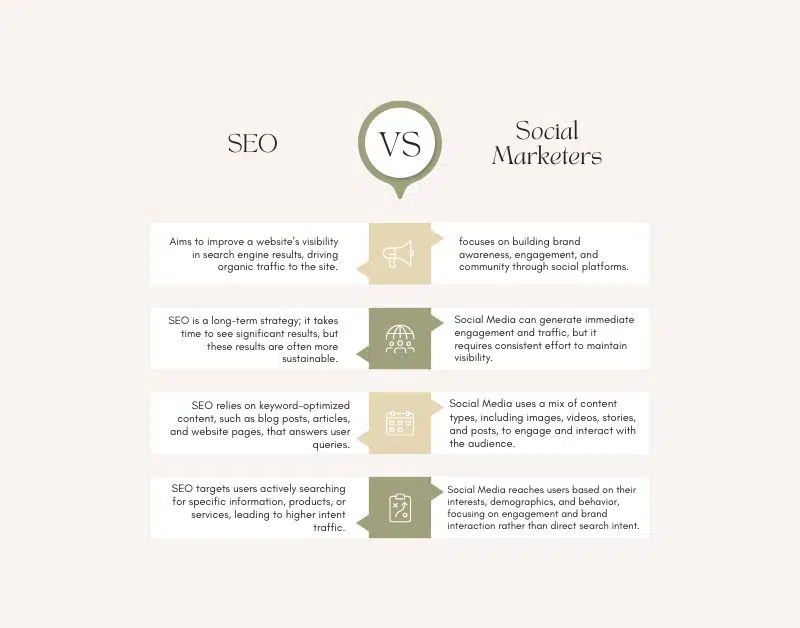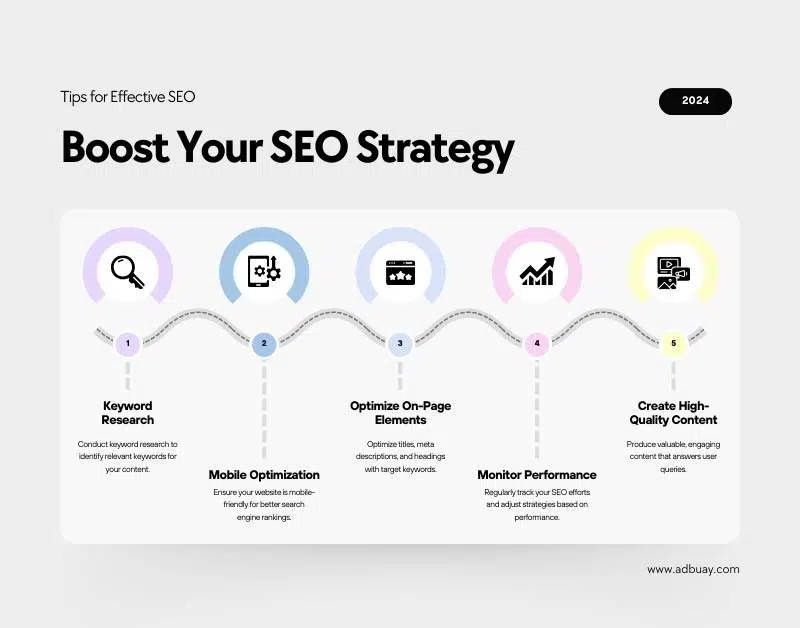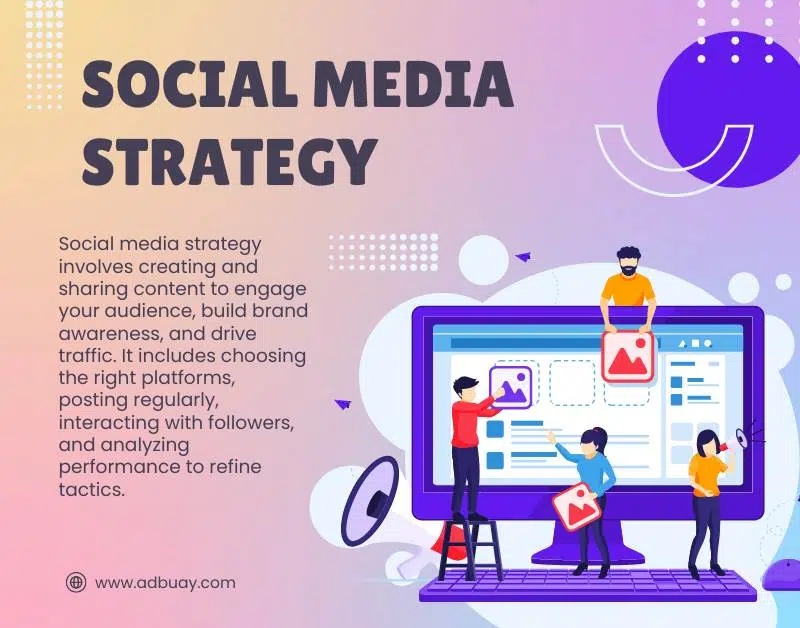Businesses have a variety of online channels to connect with clients in the modern digital environment. Social media marketing and search engine optimization (SEO) are two of the most often used strategies. Though they operate differently, each of these tactics can aid in expanding your company. We’ll discuss the advantages of SEO vs social media marketing in this blog article and how you can use both to grow your company.
Table of Contents
ToggleWhat is SEO?
SEO stands for Search Engine Optimization. It’s a set of practices that help your website appear higher in search engine results pages (SERPs) when people look for things related to your business. The goal of SEO is to make your website more visible to potential customers who are searching for products or services like yours.
How SEO Works
Search engines like Google use complex computer programs called algorithms to decide which websites to show in their search results. These algorithms look at many factors, such as:
- The words and content on your website
- How fast your website loads
- Whether your website works well on mobile devices
- How many other websites link to yours
By improving these factors, you can help your website rank higher in search results. This means more people will see your website when they search for topics related to your business.
Why SEO is Important
SEO is crucial for businesses because:
- It helps you reach people who are actively looking for what you offer
- It can bring steady, long-term traffic to your website
- It builds trust and credibility for your business
- It’s often more cost-effective than paid advertising in the long run
What is Social Media Marketing?
Social media marketing involves using social media platforms like Facebook, Instagram, Twitter, and LinkedIn to connect with your audience, build your brand, and promote your products or services. It’s about creating and sharing content that engages your followers and encourages them to interact with your business.
How Social Media Marketing Works
Social media marketing can take many forms, including:
- Posting updates about your business
- Sharing helpful or entertaining content
- Running contests or giveaways
- Responding to customer comments and messages
- Using paid advertising on social media platforms
The goal is to build a community around your brand and keep your business top-of-mind for your followers.
Why Social Media Marketing is Important
Social media marketing is valuable for businesses because:
- It allows you to connect directly with your customers
- It helps you build brand awareness and loyalty
- It provides a platform for customer service and support
- It can drive traffic to your website and increase sales

SEO vs Social Media: Key Differences
While both SEO and social media marketing can help your business grow online, they have some important differences:
1. How People Find You
With SEO, people find your business when actively searching for something related to your offer. They might type “best pizza in New York” into Google, and if your pizza shop’s website is well-optimized, it could show up in the results.
With social media, people usually encounter your business while browsing their feeds. They might not be actively looking for your products or services, but they come across your content as they scroll through posts from friends and other pages they follow.
2. Type of Traffic
SEO typically brings in more targeted traffic. When someone clicks on your website in search results, they often look for specific information or are ready to purchase.
Social media traffic can be less focused. People might click on your links out of curiosity or entertainment, but they may only sometimes be ready to buy.
3. Long-term vs Short-term Results
SEO is often a long-term strategy. Seeing significant results from your SEO efforts can take months or even years. However, once you achieve good rankings, they can last long with ongoing maintenance.
Social media can provide more immediate results. A post can go viral and bring traffic to your website quickly. However, this traffic often drops off just as fast unless you consistently create engaging content.
4. Control Over Your Presence
SEO gives you more control over how your business appears in search results. You can optimize your website’s content, structure, and technical aspects to improve rankings.
You’re at the mercy of each platform’s algorithms and rules on social media. These can change frequently, affecting how many people see your posts.
Benefits of SEO for Your Business
Now that we understand the differences between SEO and social media marketing let’s dive deeper into the specific benefits of SEO for your business.
1. Increased Visibility in Search Results
One of the main benefits of SEO is that it helps your website appear higher in search engine results. This increased visibility means more people will see your website when they search for keywords related to your business.
For example, if you run a bakery in Chicago, good SEO can help your website appear when people search for “best bakeries in Chicago” or “fresh bread delivery in Chicago.” The higher your website appears in these search results, the more likely people will click on it.
2. Targeted Traffic
SEO brings highly targeted traffic to your website. When someone searches for a specific product or service, they’re usually interested in buying or learning more. If your website appears in their search results, you can turn that visitor into a customer.
This targeted traffic is valuable because these visitors are more likely to engage with your website, sign up for your newsletter, or make a purchase.
3. Cost-Effective Marketing
While SEO requires time and resources, it can be very cost-effective in the long run. Unlike paid advertising, where you pay for each click or impression, organic search traffic from SEO is free.
Once your website ranks well for important keywords, you can continue to receive traffic without ongoing costs. This makes SEO an excellent long-term strategy for businesses of all sizes.
4. Builds Credibility and Trust
When your website appears at the top of search results, it builds credibility for your business. People tend to trust websites that rank highly in search engines, assuming that these sites must be relevant and reputable.
This trust can lead to more clicks, more time spent on your website, and, ultimately, more conversions and sales.
5. Improves User Experience
Many SEO best practices also improve the overall user experience of your website. For example:
- Making your website load faster
- Ensuring your site works well on mobile devices
- Organizing your content in a clear, easy-to-navigate structure
These improvements not only help your search engine rankings but also make your website more enjoyable for visitors to use.
6. Provides Valuable Insights
SEO tools and analytics can provide valuable insights into your customers’ behaviour. You can learn:
- What keywords do people use to find your website
- Which pages on your site are the most popular
- How long people stay on your site
- What content drives the most engagement
This information can help refine your marketing strategy and improve your products or services to meet your customers’ needs.

Benefits of Social Media Marketing for Your Business
Social media marketing offers its own unique set of benefits for businesses. Let’s explore these in detail.
1. Increases Brand Awareness
Social media platforms have billions of users worldwide. You can introduce your brand to a vast audience by maintaining an active presence on these platforms.
Every time you post content, run an ad or interact with followers, you’re increasing your brand’s visibility. Over time, this consistent presence can make your brand more recognizable and memorable to potential customers.
2. Builds Community and Customer Relationships
Social media provides a unique opportunity to interact directly with your customers. You can:
- Respond to comments and messages
- Ask for feedback
- Share behind-the-scenes content
- Host live Q&A sessions
These interactions help build a community around your brand and foster stronger customer relationships. People who feel connected to your brand are likelier to become loyal customers and recommend you to others.
3. Provides a Platform for Customer Service
Many customers now turn to social media for customer service. By being responsive on these platforms, you can:
- Address customer concerns quickly
- Show that you value customer feedback
- Turn negative experiences into positive ones
Good customer service on social media can improve customer satisfaction and loyalty, showing potential customers that you care about your clients.
4. Allows for Targeted Advertising
Social media platforms offer powerful advertising tools to target particular audiences. You can create ads based on factors like:
- Age
- Location
- Interests
- Behaviour
- Job title
This targeted advertising can be more effective and cost-efficient than traditional advertising methods, allowing you to reach the people most likely to be interested in your products or services.
5. Drives Traffic to Your Website
Social media can be a significant source of traffic for your website. By sharing links to your blog posts, product pages, or other content, you can encourage your followers to visit your site.
This traffic can increase sales, newsletter sign-ups, or other desired actions on your website.
6. Provides Real-Time Feedback and Insights
Social media gives you immediate feedback on your marketing efforts. You can see in real-time:
- How many people engage with your posts
- What types of content resonate with your audience
- What people are saying about your brand
This instant feedback lets you quickly adjust your strategy and respond to trends or customer preferences.
7. Helps You Stay Ahead of Competitors
Social media also allows you to keep an eye on your competitors. You can:
- See what kind of content they’re posting
- Monitor how their followers react
- Identify gaps in their strategy that you could fill
This competitive intelligence can help refine your strategy and stand out in your industry.

How to Use Both SEO and Social Media for Maximum Benefit
While SEO and social media marketing have their strengths, they work best when used together. Here are some ways you can combine these strategies for maximum impact:
1. Use Social Media to Support Your SEO Efforts
Social media can indirectly support your SEO efforts in several ways:
- Sharing your content on social media can lead to more backlinks, improving your search rankings.
- Social media profiles often appear in search results for your brand name, giving you more control over your online presence.
- Social signals (likes, shares, comments) may indirectly influence search rankings by increasing brand awareness and driving traffic to your site.
2. Use SEO to Inform Your Social Media Strategy
The keyword research you do for SEO can also inform your social media content strategy:
- Use popular search terms as hashtags on social media
- Create social media content around topics people are searching for
- Use SEO insights to understand what questions your audience has and answer these on social media
3. Create Content That Works for Both Channels
Develop content that performs well both in search results and on social media:
- Write in-depth blog posts that answer common questions in your industry
- Create infographics that are easy to share on social media and can attract backlinks
- Produce videos that can be optimized for YouTube (the second-largest search engine) and shared on other social platforms
4. Use Social Media to Build Relationships with Influencers
Building relationships with influencers and industry leaders on social media can lead to valuable backlinks and mentions, boosting your SEO efforts.
5. Leverage Social Media for Content Distribution
Use social media to promote and distribute your SEO-optimized content:
- Share new blog posts on your social media channels
- Create social media posts that tease or summarize your longer content
- Use paid social media advertising to boost your most valuable content
6. Use Both Channels for a Cohesive Brand Message
Ensure your brand message is consistent across your website and social media profiles. This consistency helps build trust with your audience and reinforces your brand identity.
Conclusion: Finding the Right Balance
Both SEO and social media marketing offer valuable benefits for businesses. SEO helps you reach people who are actively searching for what you offer. At the same time, social media allows you to build relationships and engage with your audience on a more personal level.
The key is to find the right balance between these two strategies based on your business goals, resources, and target audience. Using SEO and social media marketing together, you can create a powerful online presence that drives traffic, builds brand awareness, and ultimately grows your business.
Remember, both SEO and social media marketing require ongoing effort and patience. Results will take time, but with consistent work and a well-planned strategy, you can see significant improvements in your online visibility and customer engagement.
Start by setting clear goals for what you want to achieve with your online marketing efforts. Then, develop a plan incorporating SEO and social media tactics to reach these goals. Regularly review your results and be prepared to adjust your strategy as needed.
By harnessing the power of both SEO and social media, you can create a robust, multi-faceted online marketing approach that helps your business thrive in the digital age.

Mohamed Adil, is a versatile blogger specializing in social media tips, bios, Shayari, guides, and informative content. With a keen eye for detail and a passion for writing, Adbuay offers valuable insights and engaging articles that cater to a diverse audience. Stay tuned for practical advice and creative inspiration from this talented author.

